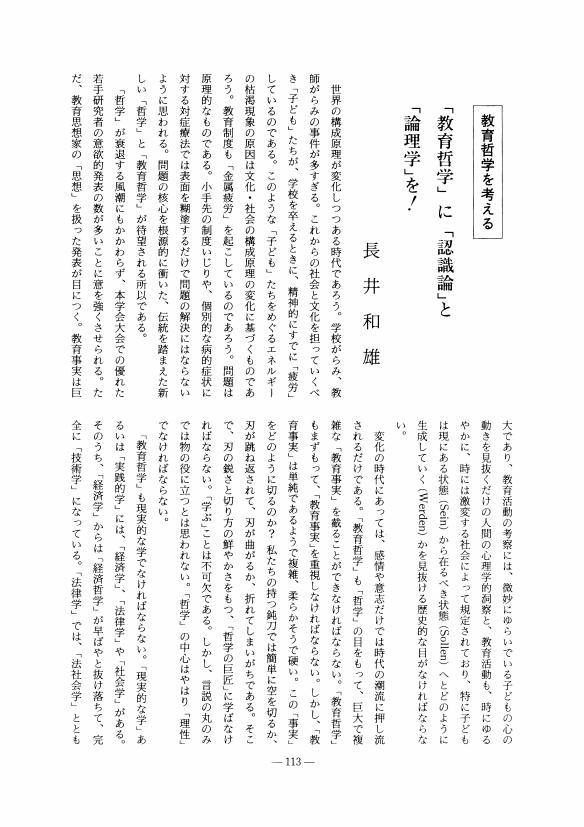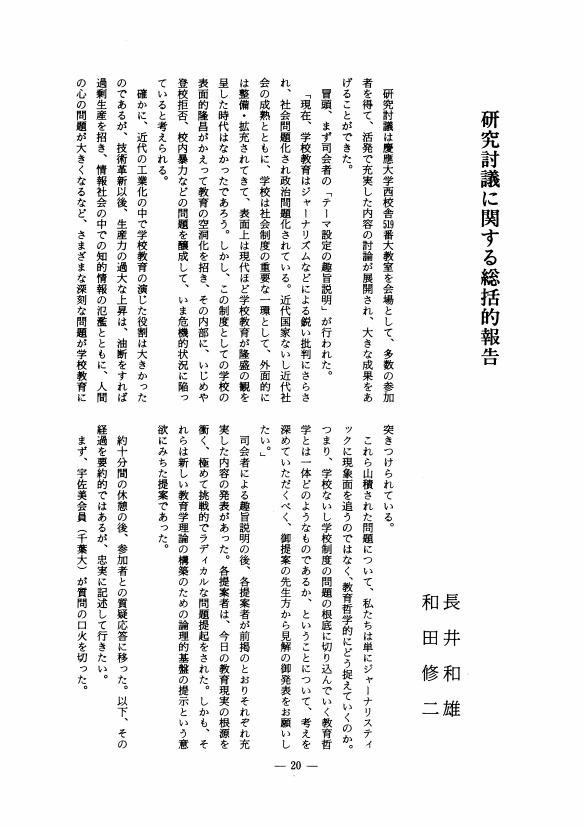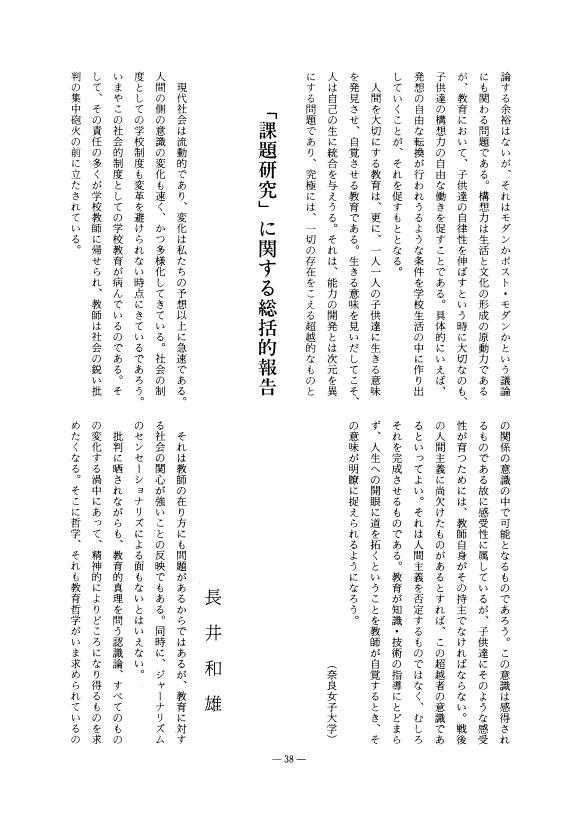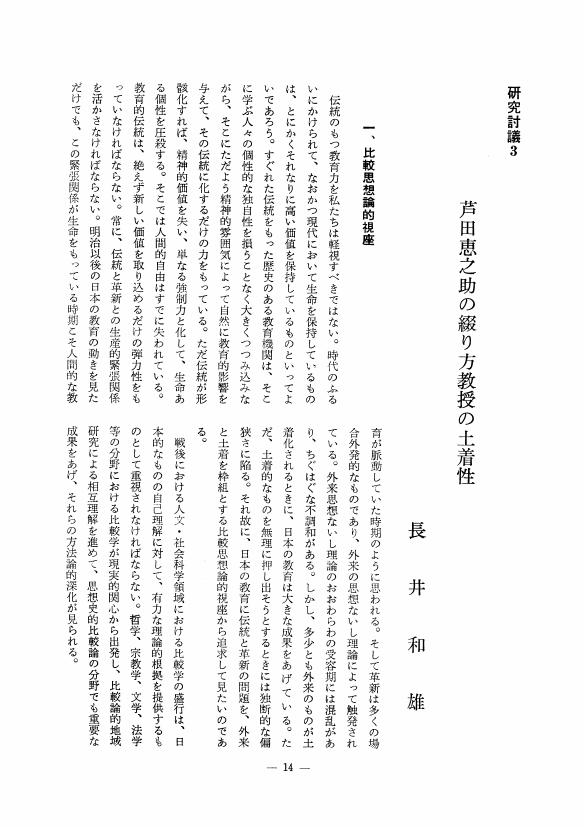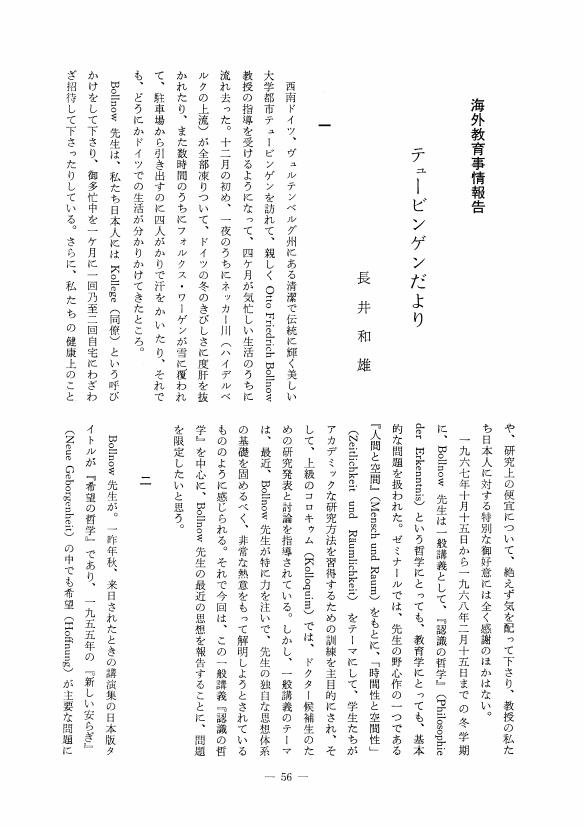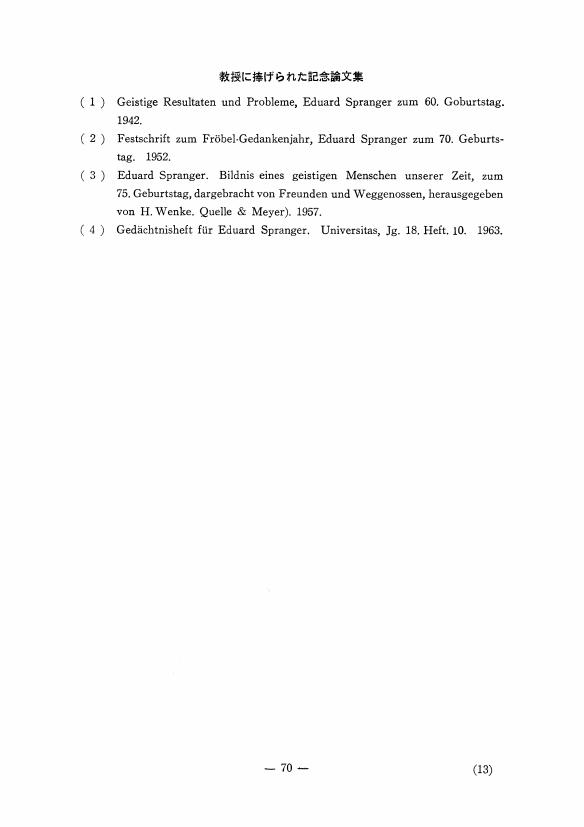2 0 0 0 OA ドイツ的意味における政治と教育
- 著者
- 長井 和雄
- 出版者
- 教育哲学会
- 雑誌
- 教育哲学研究 (ISSN:03873153)
- 巻号頁・発行日
- vol.1977, no.35, pp.1-8, 1977-05-20 (Released:2009-09-04)
1 0 0 0 OA 「教養」の復権を求めて
- 著者
- 長井 和雄
- 出版者
- 教育哲学会
- 雑誌
- 教育哲学研究 (ISSN:03873153)
- 巻号頁・発行日
- vol.1996, no.73, pp.65-76, 1996-05-10 (Released:2009-09-04)
1 0 0 0 OA 課題研究についての総括的報告
- 著者
- 堀尾 輝久 長井 和雄
- 出版者
- 教育哲学会
- 雑誌
- 教育哲学研究 (ISSN:03873153)
- 巻号頁・発行日
- vol.1993, no.67, pp.39-45, 1993-05-10 (Released:2009-09-04)
1 0 0 0 OA 教育哲学を考える 「教育哲学」に「認識論」と「論理学」を!
- 著者
- 長井 和雄
- 出版者
- 教育哲学会
- 雑誌
- 教育哲学研究 (ISSN:03873153)
- 巻号頁・発行日
- vol.1993, no.67, pp.113-114, 1993-05-10 (Released:2009-09-04)
1 0 0 0 OA 研究討議に関する総括的報告
- 著者
- 長井 和雄 和田 修二
- 出版者
- 教育哲学会
- 雑誌
- 教育哲学研究 (ISSN:03873153)
- 巻号頁・発行日
- vol.1989, no.59, pp.20-24, 1989-05-10 (Released:2009-09-04)
1 0 0 0 OA 課題研究に関する総括的報告
- 著者
- 長井 和雄 岡田 渥美
- 出版者
- 教育哲学会
- 雑誌
- 教育哲学研究 (ISSN:03873153)
- 巻号頁・発行日
- vol.1988, no.57, pp.32-39, 1988-05-10 (Released:2009-09-04)
1 0 0 0 OA 「課題研究」に関する総括的報告
- 著者
- 長井 和雄
- 出版者
- 教育哲学会
- 雑誌
- 教育哲学研究 (ISSN:03873153)
- 巻号頁・発行日
- vol.1987, no.55, pp.38-44, 1987-05-10 (Released:2009-09-04)
1 0 0 0 OA ヘーゲルにおける教育学の論理 岡本明人氏の批判に答えつつ
- 著者
- 長井 和雄
- 出版者
- 教育哲学会
- 雑誌
- 教育哲学研究 (ISSN:03873153)
- 巻号頁・発行日
- vol.1984, no.50, pp.16-33, 1984-11-10 (Released:2009-09-04)
- 参考文献数
- 11
Zunächst mochten wir 'Erziehung' als 'die Unterstützung der Entwicklung des Bewusstseins' definieren. Auch in der Gegenwart ist die Erhöhung der Erkenntniskraft einer der Hauptzwecke der Erziehung. Die Philosophie Hegels enthält die Erkenntnistheorie und die Logik der Negativität als die der “Entwicklung des Bewusstseins”. Ferner mochten wir den Satz Hegels als Ansatzpunkt bestimmen : “Das unmittelbare Dasein des Geistes, das Bewusstsein, hat zwei Momente des Wissens und derdem Wesen negativen Gegenständlichkeit”. Sodann untersuchen wir (1) die Entwicklungsstufe des Bewusstseins von der “sinnlichen Gewissheit” bis zu dem “absoluten Wissen”, und (2) drei Momente hinsichtlich des “Begriffs”, Allgemeinheit, Besonderheit und Einzelheit, auch als den logischen Rahmen.In dem absolutistischen Denken Hegels ist so der Zusammenhang der Allgemeinheit mit der Besonderheit relativistisch und dynamisch. Aber in der Menschenbildung müssen wir vor allem und hauptsächlich den Gegensatz von Allgemeinheit und Einzelheit behandeln.Bei Hegel its der Gedanke leitend, dass die Allgemeinheit entschieden der Besonderheit und der Einzelheit logisch überlegen ist. Für die Pädagogik jedoch ist die folgende Aussage am wichtigsten : “Leben, Geist, Gott - sowie den reinen Begriffvermag die Abstraktion nicht zu fassen, weil sie von ihren Erzeugnissen die Einzelheit, das Prinzip der Individualität und Personlichkeit, abhält und so zu nichts als lebund geistlosen, farb- und gehaltlosen Allgemeinheit kommt”.Nun ist die Negativität nicht blosse Abstraktion.Betreffs der 'Sozialisation' in der Erziehung hat das Hegelsche Denken sehr grosse Bedeutung. Aber wir können die Rolle der 'Individualisierung' nicht geringschätzen. Überdies trägt in dem japanischen Sprachgebrauch die 'Individualität' den Sinn der 'Eigentümlichkeit der Inividualität' wie z. B. bei Schleiermacher oder W. v. Humboldt.Sogar “das absolute Wissen” als “die höchste konkrete Allgemeinheit” kann den pädagogischen Sinn der 'Individualität' nicht ausschöpfen.
1 0 0 0 OA 研究討議に関する総括的報告
- 著者
- 松川 成夫 長井 和雄
- 出版者
- 教育哲学会
- 雑誌
- 教育哲学研究 (ISSN:03873153)
- 巻号頁・発行日
- vol.1981, no.43, pp.25-30, 1981-05-10 (Released:2009-09-04)
1 0 0 0 OA 芦田恵之助の綴り方教授の土着性
- 著者
- 長井 和雄
- 出版者
- 教育哲学会
- 雑誌
- 教育哲学研究 (ISSN:03873153)
- 巻号頁・発行日
- vol.1975, no.31, pp.14-19, 1975-05-20 (Released:2009-09-04)
1 0 0 0 OA 村田昇著『国家と教育-シュプランガー政治教育思想の研究-』
- 著者
- 長井 和雄
- 出版者
- 教育哲学会
- 雑誌
- 教育哲学研究 (ISSN:03873153)
- 巻号頁・発行日
- vol.1969, no.20, pp.72-77, 1969-10-15 (Released:2009-09-04)
1 0 0 0 OA テュービンゲンだより
- 著者
- 長井 和雄
- 出版者
- 教育哲学会
- 雑誌
- 教育哲学研究 (ISSN:03873153)
- 巻号頁・発行日
- vol.1968, no.17, pp.56-62, 1968-05-20 (Released:2009-09-04)
- 参考文献数
- 5
1 0 0 0 OA エドゥアルト・シュプランガー博士略歴と著作目録
- 著者
- 長井 和雄
- 出版者
- 教育哲学会
- 雑誌
- 教育哲学研究 (ISSN:03873153)
- 巻号頁・発行日
- vol.1964, no.10, pp.70-79, 1964 (Released:2010-05-07)
- 参考文献数
- 120
1 0 0 0 OA 教育と歴史的青年時代
- 著者
- 長井 和雄
- 出版者
- 教育哲学会
- 雑誌
- 教育哲学研究 (ISSN:03873153)
- 巻号頁・発行日
- vol.1962, no.6, pp.1-15, 1962-06-25 (Released:2009-09-04)
We cannot say that every generation of youth becomes a moving force in history. The frightfully complicated organization of our objective society of today works automatically in such a way that the creative energy of youth in the cultural fields may be crushed and completely dried up. Education, while paying steady attention to the development of the more realistic side of cultural life, as represented in politics, economics, and sociology, must at the same time play another role in life. That is to say, so far as the ideal side of life is concerned, it must continually re-evaluate the educational meaning of the methods of teaching what may be looked on as the flowering of human culture, the arts, science, and religion, all of which have value in themselves. This it does by keeping in the center of its vision the uniqueness and inconvertibility of general culture. In these matters it is necessary for educators to expend great efforts so that each individual may reach a definite level of historical and cultural awareness. At this point the question of the gestaltende Idee, in Spranger's sense of the word, becomes a matter of educationl importance. It transcends positivistic knowledge of the objective side of culture and, laying hold of the soul of the free man, gives him the ethical elan which looks toward the future. By giving a central position to this gestaltende Idee, educators can give to the younger generation the possibility of becoming a moving force in history. This they do when they create a community of values in which the individual, retaining his uniqueness, works closely with his fellows in activity of worth.
1 0 0 0 OA シュプランガー著「生れながらの教育者」
- 著者
- 長井 和雄
- 出版者
- 教育哲学会
- 雑誌
- 教育哲学研究 (ISSN:03873153)
- 巻号頁・発行日
- vol.1959, no.1, pp.91-92, 1959-06-10 (Released:2009-09-04)
シュプランガー教授の最近著『生れながらの教育者』 (Der geborene Erzieher.1958. Heidelberg. 111 Seiten) は、一九五六年初頭にヴァインガルテンの教育学研究所の修了式において、これから教職に就こうとする若い人々に対して行った講演である。



